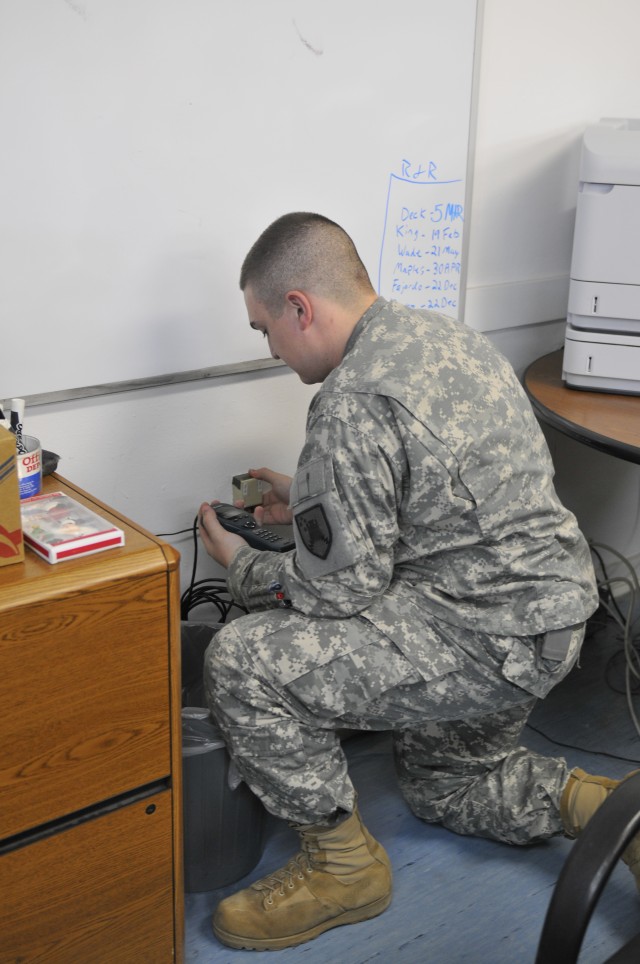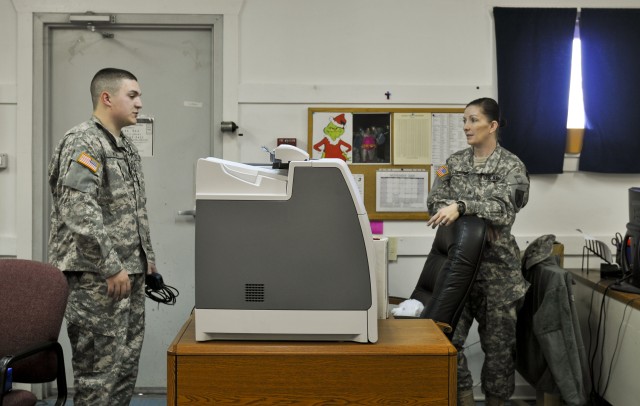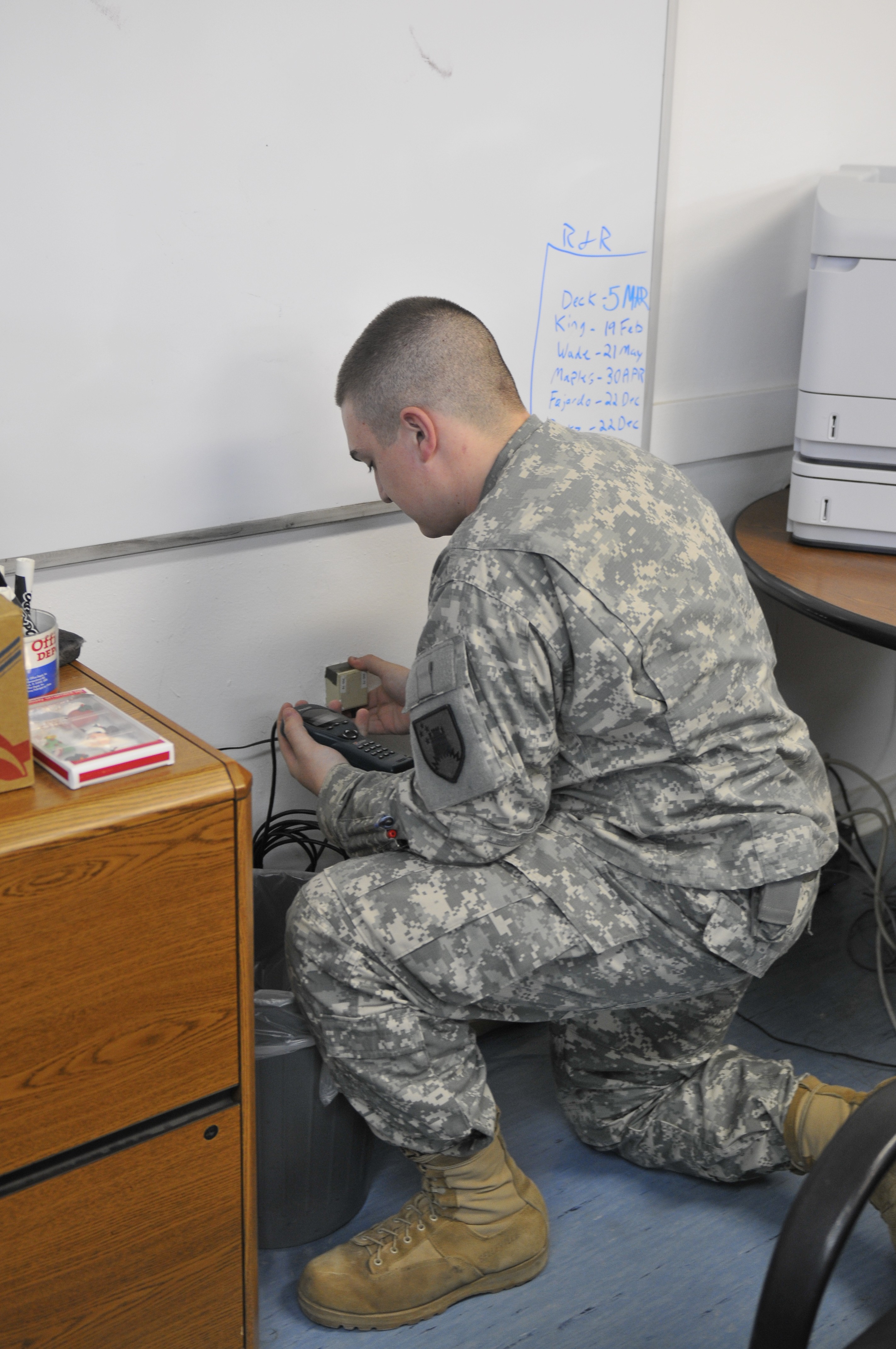CAMP BONDSTEEL, KOSOVO - "What do we do with printers that don\'t work'" "How often is the shared network backed-up'" and "Where are you guys at with my Help Desk ticket'"
These are just a handful of the questions heard Nov. 21-- a relatively slow day -- at the G6 Help Desk with Spc. Thomas Kok.
Kok works as a Help Desk administrator for G6, Information Technology.
"Saturdays are usually pretty slow, unless there is a VTC (Video Teleconference) or conference," Kok said. "We have to set them up and have visuals on them."
Since KFOR 12's arrival at Camp Bondsteel, the G6 has been busy. Shared network access and linking to those folders, and non-secured internet protocol router (NIPR) and secured internet protocol router (SIPR) account access are some of the most common customer problems.
One of the early problems the G6 found, during its transition with KFOR 11, was that the shared network folder had already been closed. But people still needed access to the information in it. When the problem finally was resolved, everyone had access to their information, once permissions were granted.
Next, some NIPR/SIPR accounts were not made, or made in error, and still needed to be set up. Unfortunately, this is not a simple process.
"NIPR/SIPR machines not working and needing to be moved are our primary focus," Kok said. "There is plenty of paperwork and training to be in charge of an AO (Area of Operation) of SIPR machines to make sure they are where they should be, that they are not being moved and that they are accounted for."
On the morning of Nov. 21, the Help Desk had an issue with a SIPR machine not letting a person in and the day before they had an issue with a SIPR machine that was not active or accredited with an Information Assurance Security Officer (IASO). This machine was mission essential to that department, but nothing could be done since the ISO training and packets were not completed and would not be completed until Wednesday. The account access was needed much sooner than Wednesday.
"Everything has a process, a policy to follow, and many things need a couple days to find a resolution or a work-around," Kok said.
Completely finishing and closing a Help Desk ticket is not the easiest process. Most tickets come through the G6's Help Desk, but some come through Network Service Center (NSC), more commonly known as "119." NSC is a contracted company that works here at Camp Bondsteel with the G6, and conducts work that goes beyond the maintenance level.
The life of a Help Desk ticket is quite long. Once the call is placed to 119, it is sent to Kok; if Kok receives the call, he will place the ticket. Kok may then make an office visit or call to verify the problem or gather more information. The ticket is then sent with full information and justification to the G6 approving officials, which is usually Staff Sgt. Brad Turck, NCOIC of G6, to be approved or denied; it is then sent to NSC to be approved or denied, and then sent back to Kok to work on. Some tickets make a full circle back to Kok to be corrected if they were not submitted correctly, and then back through the same chains again.
During the day spent with the Help Desk, people came in to drop off certificates of completion for data and computer training, to ask if their cell phone agreement is on file and to ask if their office's tickets are being worked. A few people actually stopped in "just to say hi," and some just to steal candy from the candy dish. Phones rang with questions about prior tickets being completed, links not working on public Web sites and getting Common Access Card (CAC) readers for laptops, just to name a few.
As Kok showed me around the different offices and the areas that G6 work out of, we were stopped a number of times - everyone had a question about something that needed to be fixed, moved or changed:
"How often is the shared network backed up'"
"Do you know why I can't get my database to burn correctly'"
"Have you been able to work on a fix for my document'"
"Can we move printers around the room' Not even if we change jacks'"
"What do we do with all these extra printers that don't work'"
A lot of equipment was found in offices that wasn't needed or didn't work. Some equipment was never even used, but was never turned in. No one knows what to do with those items.
"The system is not smooth," Turck said, "we are developing relationships with other departments including supply, NSC and Tier 3."
Tier 3 is a contractor that looks at all equipment when it is not working and decides if it can be repaired. If it can be, they work on it.
The Help Desk receives and maintains forms for many different requests, including requests for Share Point, Network Share, VTC, and for new NIPR/SIPR accounts.
VTC and conference rooms are also requested and set up through the Help Desk. Requests must be made 72 hours in advance so the G6 can contact Heidelberg, Germany, for coordinating purposes. All conference information is required by Army Europe because all VTCs require secured lines.
The G6 is currently setting up and monitoring three VTCs a week. That process includes setting up equipment for the rooms and providing support should any issues occur.
Between setting equipment up, making sure it is working, answering every question imaginable and running to different offices to verify problems and help when they can, members of the G6 keep great attitudes and high spirits.
Even though it seems that the Help Desk's job should get easier as time goes by and everyone on base gets set up, it is not. Next on the "to do" list is loading hard drive encrypting software on approximately 1,200 computers and a lifecycle replacement on all old SIPR machines.
Although the Help Desk is usually open from 0730-1930, Monday through Friday, and 0800-1700 on Saturday's, members of the G6 often find themselves working odd hours.
"We are always on call," Kok said, "We have even received calls in the middle of the night."




Social Sharing